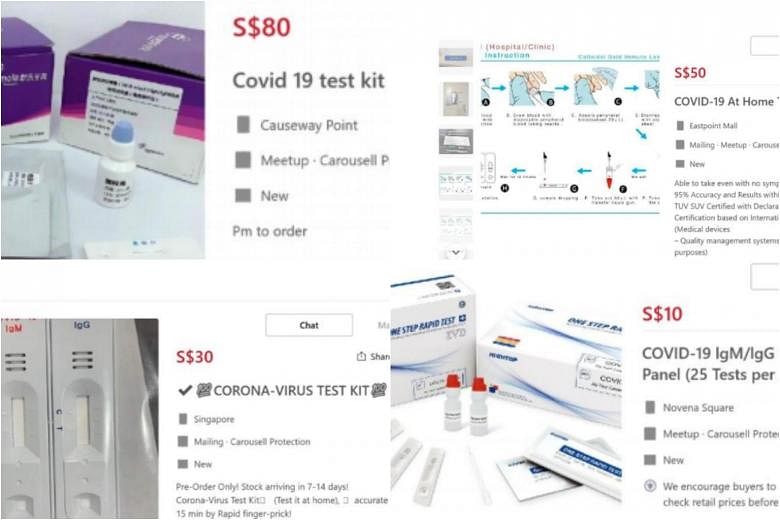SINGAPORE - The Health Sciences Authority (HSA) has removed more than 1,700 listings of products making false Covid-19-related claims from local websites since February, including illegal test kits priced from $10 to $290.
The authority has also issued more than 1,600 warning letters to sellers and companies hawking such goods, with observers noting that sellers were exploiting fears over the coronavirus pandemic. The sellers were mostly independent retailers and sellers on online platforms.
HSA said on Wednesday (May 6) that companies were found falsely advertising a range of general wellness goods - such as herbal remedies, probiotics and health supplements - as being "good for coronavirus".
Others that were selling hand sanitisers or disinfectant sprays also made unscientific claims that these "kill viruses including coronavirus" when hand sanitisers may not eliminate all types of germs and may not work well if a person's hands are visibly dirty.
Associate Professor Chan Cheng Leng, group director of the health products regulation group at HSA, said people should beware of such marketing gimmicks.
"Not only do consumers waste money on these unproven remedies, they may put themselves and people around them at unnecessary risk due to the false sense of security," he said.
Of the 1,700 online product listings that HSA removed, the bulk of them, 47 per cent, were medical devices such as test kits and respirators; 41 per cent were hand sanitisers and disinfectant sprays; 7 per cent were health supplements and traditional medicines; and the remaining 5 per cent were other products such as chloroquine, cleansers and body soap.
Working with social media and e-commerce sites - such as Carousell, Lazada, Shopee, eBay, Qoo10 and Facebook - HSA removed more than 40 listings of unapproved Covid-19 test kits, which it said were all imported.
It clarified that testing for the coronavirus can be done only by clinical laboratories or medical professionals in clinics and hospitals.
Very often, test kits sold online have design or technological flaws that may show false negatives, creating a false sense of security. They could also convince people to postpone treatment when they need it and result in them spreading Covid-19 unknowingly, HSA added.
Dr Leong Hoe Nam, an infectious disease specialist at Mount Elizabeth Hospital, said that it was "unfortunate that many unscrupulous dealers preyed on the fears of (the) public, offering these unproven tests and treatment regimens and even oversell their sanitisers".
"This is not only falsely misleading, it is ethically wrong... The more impossible the claims are, the more likely it is a dud," Dr Leong added.
HSA said the unapproved test kits often promised results in two minutes. But tests by the authorities typically take much longer.
Swab test results in Singapore hospitals take six to 10 hours, while a faster test kit the Singapore Government uses at border checkpoints still requires three hours, according to Ms May Ong, a director at the Home Team Science and Technology Agency. The public agency was involved in the making of the test kits used at checkpoints.
Although research teams in Hong Kong and Macau have reportedly claimed to have come up with faster ways of testing, these solutions still take at least 30 to 40 minutes to give results.
HSA said that it has intensified surveillance of shops and e-commerce platforms, and will take stern action against those who make misleading claims.
"Any claim made in relation to Covid-19 must be supported by the appropriate scientific evidence," it said, adding that such claims must first be evaluated and registered by HSA.
If found guilty of falsely advertising products as preventing or treating Covid-19, sellers can be jailed for up to a year, fined up to $20,000, or both.












